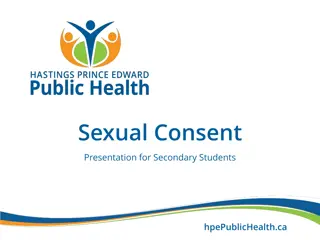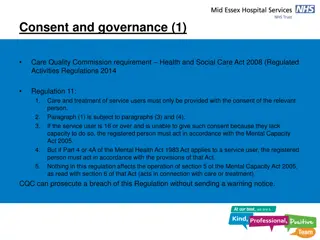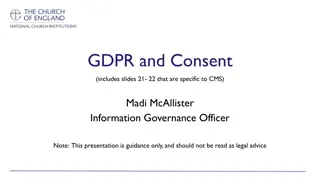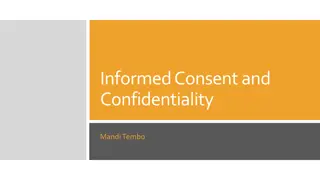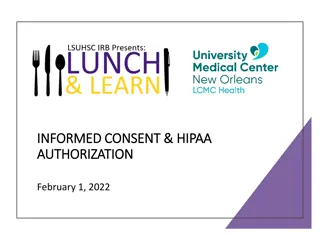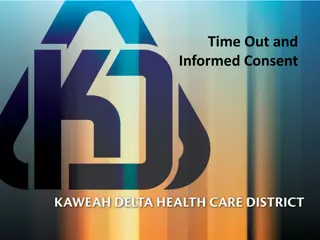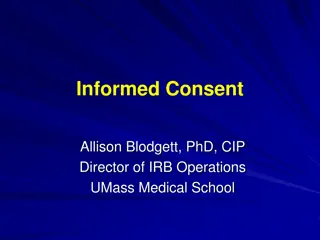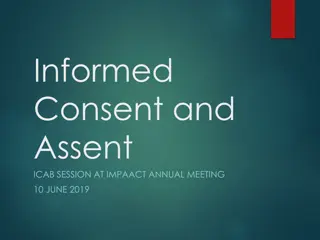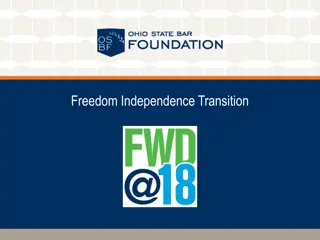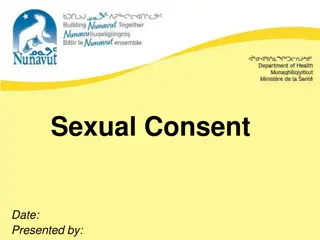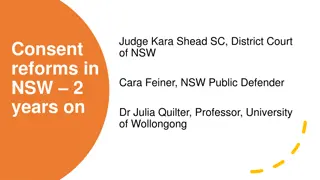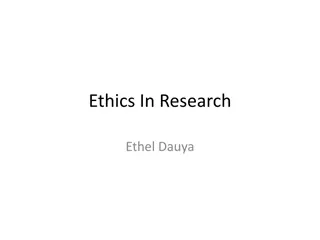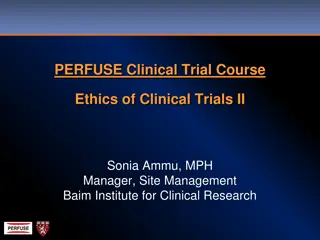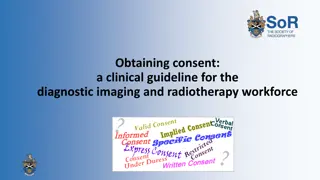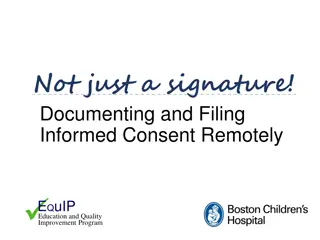Understanding Informed Consent in Research
Explore the fundamentals of informed consent in research, including ICH G6 (R2) guidance, study resources, webinars, and contact information for further inquiries at dbran@uthsc.edu and mlynn@uthsc.edu.
Download Presentation

Please find below an Image/Link to download the presentation.
The content on the website is provided AS IS for your information and personal use only. It may not be sold, licensed, or shared on other websites without obtaining consent from the author. Download presentation by click this link. If you encounter any issues during the download, it is possible that the publisher has removed the file from their server.
E N D
Presentation Transcript
Session 15: Informed Consent Part 1
Need information? Worksheets Informed Consent Study Guide ICH G6 (R2) Guidance for Informed Consent Webinars to view Research 101, Session Six Research 102, Session Six dbran@uthsc.edu mlynn@uthsc.edu Tennessee Clinical and Translational Science Institute Seminars and Workshops TN-CTSI (uthsc.edu) Derita Bran and Margaret Lynn have no financial or other conflict of interest disclosures.
1947, Nuremberg Code, Voluntary consent is essential. essential. Voluntary consent is 1964, Declaration of Helsinki, World Medical Association, Consent should be obtained if Consent should be obtained if at all possible and increased vigilance is at all possible and increased vigilance is needed for vulnerable subjects. needed for vulnerable subjects. Historical Historical Development of Development of Regulations/Guidance Regulations/Guidance for Informed Consent for Informed Consent 1979, Belmont Report had three core principals, Respect for persons, beneficence and justice. Informed consent is necessary Informed consent is necessary part of showing respect for all persons. part of showing respect for all persons. 1981 FDA harmonized 21 CFR 50 with OHRP 45 CFR 56, Subpart A. These codes of federal regulations outline requirements for federal regulations outline requirements for obtaining informed consent. obtaining informed consent. These codes of
1991, The Common Rule, 45 CFR 46, was adopted by many of the governmental agencies. The common rule is the baseline standard of ethics by which any government-funded research in the US is held. Nearly all academic institutions hold their researchers to these standards regardless of funding. The revised common rule was implemented on January 21, 2019. Historical Historical Development of Development of Regulations/Guidance Regulations/Guidance for Informed Consent for Informed Consent (cont.) (cont.) 199I International Conference for Harmonisation Good Clinical Practice [GCP] Freely given informed consent should be Freely given informed consent should be obtained from every subject prior to clinical obtained from every subject prior to clinical trial participation. trial participation.
Other sources: Other sources: FDA Guidance Documents IRB SOPs Protocols Department/Institution policies State or local laws Regulations/Guidance Regulations/Guidance for Informed Consent for Informed Consent Follow the most restrictive policies regarding Follow the most restrictive policies regarding the informed consent process. the informed consent process.
Ethical requirement---respect for persons Belmont Belmont Report Report Ensures the subject is fully and accurately informed Consent Consent = = Respect Respect for for persons persons May demonstrates comprehension of the information Authenticates decision is voluntary Protect the rights, safety and well-being of subjects
It begins with recruitment materials It begins with recruitment materials such as flyers, ads, emails. such as flyers, ads, emails. 1. 1. It continues with the first conversation It continues with the first conversation regarding the study with the potential regarding the study with the potential subject. subject. 2. 2. Informed Informed Consent Consent Process Process Allow ample time for discussion and Allow ample time for discussion and exchange of information and time for exchange of information and time for the potential subject to discuss the potential subject to discuss participation with family / friends. participation with family / friends. 3. 3. Always allow time for questions. Always allow time for questions. 4. 4. Document the consent process in the Document the consent process in the research record. research record. 5. 5.
(1) Before involving a human subject in research covered by this policy, an investigator shall obtain the legally effective informed consent of the subject or the subject s legally authorized representative. (2) An investigator shall seek informed consent only under circumstances that provide the prospective subject or the legally authorized representative sufficient opportunity to discuss and consider whether or not to participate and that minimize the possibility of coercion or undue influence. General General Requirements Requirements for Informed for Informed Consent Consent (3) The information that is given to the subject or the legally authorized representative shall be in language understandable to the subject or the legally authorized representative. (4) The prospective subject or the legally authorized representative must be provided with the information that a reasonable person would want to have in order to make an informed decision about whether to participate, and an opportunity to discuss that information.
(5) Except for broad consent: (i) Informed consent must begin with a concise and focused presentation of the key information that is most likely to assist a prospective subject or legally authorized representative in understanding the reasons why one might or might not want to participate in the research. This part of the informed consent must be organized and presented in a way that facilitates comprehension. General General Requirements Requirements for Informed for Informed Consent Consent (ii) Informed consent as a whole must present information in sufficient detail relating to the research, and must be organized and presented in a way that does not merely provide lists of isolated facts, but rather facilitates the prospective subject s or legally authorized representative s understanding of the reasons why one might or might not want to participate.
In the revised Common Rule, "broad consent" is an alternative consent process only storage, maintenance, and secondary use of identifiable private information or identifiable biospecimens for future, yet-to-be- specified research. only for the Broad Consent Some institutions are choosing not to use broad consent because tracking has to be done for specimen use.
General General Requirements Requirements for Informed for Informed Consent Consent (6) No informed consent may include any exculpatory language through which the subject or the legally authorized representative is made to waive or appear to waive any of the subject s legal rights, or releases or appears to release the investigator, the sponsor, the institution, or its agents from liability for negligence.
FDA considers exculpatory language to be language that has the general effect of freeing or appearing to free an individual or an entity from malpractice, negligence, blame, fault, or guilt. Exculpatory Language
The following are examples of exculpatory language that would violate compliance and therefore cannot appear in consent forms: I waive any possibility of compensation, including any right to sue, for injuries that I may receive as a result of participation in this research. If you suffer a research-related injury, neither the institution nor the investigator can assume financial responsibility or liability for the expenses of treatment for such injury. In the event that you suffer a research- related injury, your medical expenses will be your responsibility or that of your third party payer. Exculpatory Language
An example of one potential way to explain that a subject's legal right to seek to collect compensation for research-related injuries in certain situations is not being waived is included below. Preventing Exculpatory Language In the event that you suffer a research- related injury, your medical expenses will be your responsibility or that of your third- party payer, although you are not precluded from seeking to collect compensation for injury related to malpractice, fault, or blame on the part of those involved in the research.
The process must occur The process must occur without the without the possibility of possibility of coercion coercion or or undue influence. undue influence. Informed Informed Consent Consent
Coercion Coercion The practice of persuading someone to do something by using force or threats is coercion. Examples: Ms. Smith, you will not be able to obtain medical care from this clinic if you choose not to participate in this study. Prisoner Jones, you will lose your canteen rights and / or will lose potential parole if you do not participate in a research study.
Undue Undue Influence Influence Undue influence Undue influence, by contrast, often occurs through an offer of an excessive or inappropriate reward or other overture in order to obtain compliance.
Undue Influence Examples Undue Influence Examples An investigator might promise psychology students extra credit if they participate in the research. If that is the only way a student can earn extra credit, then the investigator is unduly influencing potential subjects. If, however, the investigator offers comparable non-research alternatives for earning extra credit, the possibility of undue influence is minimized. Undue influence also can be subtle. For example, potential subjects might feel obligated to participate in research if their physician is also the investigator, or students might feel pressure to participate in research if everyone else in the class is doing so. Excessive payments for participation or compensation for time and travel.
Test your knowledge
University of California Santa Barbara Policy Statement University of California Santa Barbara Policy Statement 1. A subject's participation in research must be completely voluntary. 2. Great care should be taken by investigators to avoid even the appearance of coercion or undue influence when recruiting potential study subjects. 3. For this reason, the Human Subjects Committee (HSC) is required to review and approve all subject recruitment procedures and materials to make sure they do not downplay serious risks, give the impression that participation is mandatory, or emphasize financial inducements. 4. Also, to reduce the potential for real and apparent coercion of study subjects, UCSB discourages investigators from direct solicitation of students in their own classes and employees in their own department. 5. An investigator may recruit students or personnel from their department with general recruitment advertisements (such as a poster hanging in a lounge) or additional safeguards protecting subjects from actual or perceived coercion must be added to the protocol. Resource: UC Santa Barbara
To reduce the potential for coercion or undue influence during recruitment of UCSB-affiliated human research subjects, investigators should: a. Use general, public recruitment tools (such as posters, fliers and other advertisements) to recruit on and off campus audiences only. b. Avoid directly approaching or soliciting employees, students or staff in their own classes and departments c. Require participation by only those employees, students, and staff in their own departments d. Completely exclude UCSB faculty, students, and staff from participation in research e. a and b
To reduce the potential for coercion or undue influence during recruitment of UCSB-affiliated human research subjects, investigators should: a. Use general, public recruitment tools (such as posters, fliers and other advertisements) to recruit on and off campus audiences only. b. Avoid directly approaching or soliciting employees, students or staff in their own classes and departments c. Require participation by only those employees, students, and staff in their own departments d. Completely exclude UCSB faculty, students, and staff from participation in research e. a and b
The Nine Essential Elements of the ICF Research, Purposes, duration, Procedures and which are experimental Risks or discomfort Benefits Alternative procedures or course of treatment Confidentiality of research records
The Nine Essential Elements of the ICF (cont) For more than minimal risk studies, an explanation as to whether any compensation is available if injury occurs. Contact Voluntarism with no penalty One of the following statement about identifiable private information or biospecimens Identifiers might be removed and used for future research Information ever if identifiers are removed will not be used for future research
Risks if the subject is or may become pregnant Additional Additional Elements of Elements of Informed Informed Consent Consent That May be That May be Included if Included if Pertinent Pertinent Circumstances under which the subject s participation may be terminated by the PI Additional costs to the subject Consequences of a subject s decision to withdraw New findings that may affect willingness to participate Approximate number of subjects
A statement that the subjects biospecimens (even if identifiers are removed) may be used for commercial profit and whether the subject will or will not share in this commercial profit Additional Additional Elements of Elements of Informed Informed Consent Consent That May be That May be Included if Included if Pertinent Pertinent ( (cont cont) ) A statement regarding whether clinically relevant research results, including individual research results, will be disclosed to subjects, and if so, under what conditions For research involving biospecimens, whether the research will (if known) or might include whole genome sequencing (i.e., sequencing of a human germline or somatic specimen with the intent to generate the genome or exome sequence of that specimen)
Nine Additional Elements of Informed Consent (as appropriate)
The Elements of informed consent are virtually identical except: 21 CFR 50 vs 45 CFR 46 FDA requires the confidentiality statement to note "the possibility that the FDA may inspect the records FDA requires a statement regarding study registry in Clinicaltrials.gov.
The research involves no more than minimal risk to the subjects Under what conditions can an IRB grant a waiver or alteration of the consent process under 45 CFR 46? The research could not practicably be carried out without the requested waiver or alteration If the research involves using identifiable private information or identifiable biospecimens, the research could not practicably be carried out without using such information or biospecimens in an identifiable format The waiver or alteration will not adversely affect the rights and welfare of the subjects Whenever appropriate, the subjects or legally authorized representatives will be provided with additional pertinent information after participation
21 CFR 50.23: emergency use of a test article: 21 CFR 50.23: emergency use of a test article: Under what conditions can an IRB grant a waiver or alteration of the consent process under 21 CFR 50? Life threatening Life threatening Informed consent cannot be obtained Informed consent cannot be obtained Time is not sufficient to obtain consen Time is not sufficient to obtain consent from the legally authorized representative authorized representative t from the legally There is no alternative treatment There is no alternative treatment The test article, in the opinion of the investigator is life The test article, in the opinion of the investigator is life- - saving saving Must be validated in writing by a physician who is not Must be validated in writing by a physician who is not participating in the clinical investigation participating in the clinical investigation This Documentation should be submitted to the IRB This Documentation should be submitted to the IRB within 5 working days after use of the test article. within 5 working days after use of the test article.
Under what conditions can an IRB grant a waiver or alteration of the consent process under 21 CFR 50? 21 CFR 50.24 emergency research. 21 CFR 50.24 emergency research. The IRB must review and approve the clinical The IRB must review and approve the clinical investigation without requiring informed consent investigation without requiring informed consent Obtaining informed consent is not feasible Obtaining informed consent is not feasible Because subjects are unable to consent because of their Because subjects are unable to consent because of their medical condition, the intervention must be administered medical condition, the intervention must be administered before the consent from the LAR is feasible. There is not before the consent from the LAR is feasible. There is not a way to identify a way to identify prospective subjects likely prospective subjects likely to become participants in participants in the investigation. the investigation. to become
Under what conditions can an IRB grant a waiver or alteration of the consent process under 21 CFR 50? (cont.) Participation in the research holds out the prospect of Participation in the research holds out the prospect of direct benefit direct benefit The investigation could not be practicably be carried out The investigation could not be practicably be carried out without the waiver without the waiver The clinical investigation defines the length of potential The clinical investigation defines the length of potential therapeutic window and obtain the consent from the LAR therapeutic window and obtain the consent from the LAR The LAR will review the informed consent procedures The LAR will review the informed consent procedures Additional protections of the rights and welfare of Additional protections of the rights and welfare of subjects will be provided, such as, public disclosure, data subjects will be provided, such as, public disclosure, data monitoring committee, a procedure to inform subjects at monitoring committee, a procedure to inform subjects at the earliest feasible opportunity about the clinical the earliest feasible opportunity about the clinical investigation. investigation.
Waiver or Alteration of the Consent Process under 21 CFR 50? 21 CFR 50.23: 21 CFR 50.23: There is also a provision under this regulation for the There is also a provision under this regulation for the President of the United States to waive prior consent for President of the United States to waive prior consent for the administration of an investigational new drug to a the administration of an investigational new drug to a member of the armed forces in connection with the member of the armed forces in connection with the member s participation in a particular military member s participation in a particular military operation. operation.
45 CFR 46.104 (d)(3)(iii) If the research involves deceiving the subjects regarding the nature or purposes of the research, this exemption is not applicable unless the subject authorizes the deception through a prospective agreement to participate in research in circumstances in which the subject is informed that he or she will be unaware of or misled regarding the nature or purposes of the research. Consent Requirement When the Research Involves Deception
Example: Consent requirement when the research involves Deception A Principal Investigator wants to observe the facial expressions of students with A+ grade averages when told they did poorly on an exam. In truth, they performed well on the test. Prior to participation in this study, the Principal Investigator must tell the students that they will not know the purpose of the study but will be informed later.
Therapeutic misconception is a subjects belief that participating in a clinical trial will be beneficial or therapeutic . It is of the utmost ethical principle that patients understand that the therapy during a clinical trial MAY be beneficial but not guaranteed. Therapeutic Therapeutic misconception misconception Patients desperate for a cure may do anything for hope and this places potential subjects in a vulnerable position of participating in a study without understanding all of the facts about participation.
Documentation of Informed Consent Documentation of Informed Consent Informed consent shall be documented by the use of a written informed consent form approved by the IRB. The ICF should be signed (including in an electronic format) by the subject or the subject s legally authorized representative. A written copy shall be given to the person signing the informed consent form.
Both OHRP and FDA state that informed consent may be either of the following: Documentation Documentation of Informed of Informed Consent Consent (1) A full written informed consent form that meets the requirements. (2) A short form written informed consent form
45 CFR 46.117 (c)(1) An IRB may waive the requirement for the investigator to obtain a signed informed consent form for some or all subjects if it finds any of the following: (i) That the only record linking the subject and the research would be the informed consent form and the principal risk would be potential harm resulting from a breach of confidentiality. Each subject (or legally authorized representative) will be asked whether the subject wants documentation linking the subject with the research, and the subject s wishes will govern; (ii) That the research presents no more than minimal risk of harm to subjects and involves no procedures for which written consent is normally required outside of the research context; or (iii) If the subjects or legally authorized representatives are members of a distinct cultural group or community in which signing forms is not the norm, that the research presents no more than minimal risk of harm to subjects and provided there is an appropriate alternative mechanism for documenting that informed consent was obtained. (2) In cases in which the documentation requirement is waived, the IRB may require the investigator to provide subjects or legally authorized representatives with a written statement regarding the research. Waiver of Waiver of Documentation Documentation of Informed of Informed Consent Consent
ICF Dates, Times and Copies Comparison
Original to be maintained with research documents unless approval by IRB to maintain in different manner Give a copy to subject. Give a signed copy if following ICH GCP E6(R2) Completion of the ICP documentation Document and place a copy of the signed ICF in the subject s medical record (if required) Document continued desire to participate at each subsequent study visit Re-Consent if needed Remember--- IT IS an ONGOING PROCESS. What Is What Is Needed Needed After After Obtaining Obtaining Consent? Consent?
What to Document What to Document regarding the ICP? regarding the ICP? Utilize a template for documentation of the process and include: Sufficient opportunity to consider participation Ample time and opportunity to inquire details of the trial ICP conducted without coercion or undue influence Subject states understanding of procedures, risks, and benefits ICF signed and dated before any study procedures were performed
Example of consent documentation Subject Name: ________________________________ On the _____ day of ________,_______ I discussed the possibility of participating in a clinical research trial for Protocol __________________IRB #:__________________with the above named subject. The study was explained in detail including, but not limited to, the contents of the informed consent, purpose of the study, visits and procedures involved, risks and benefits, alternative treatments, confidentiality, right to withdraw from the study at any time, treatments provided, arms of the study, and randomization. The subject was encouraged to ask questions. All questions were answered to the satisfaction of the subject. The subject was given adequate time to read the informed consent and the opportunity to discuss it. The subject demonstrated understanding of the informed consent and a copy was given to the subject. The discussion was free of undue influence or coercion. The informed consent was signed on _____/_____/______ at ______ am/pm prior to any study-related procedures being performed. If the primary language of the adult subject or LAR; or of the child subject or parent/legal guardian is not English: Primary language: ____________________________ A translator participated in the informed consent interview. OR A translator did not participate in the informed consent interview because the person who obtained consent is fluent in both English and the primary language. _______________________________ _______________ Signature of person obtaining consent Date ______________________________ _______________ Signature of PI (if different from above) Date
Remember: Follow the applicable regulations, guidance, and/or SOPs for obtaining consent The ICP is conducted to protect the rights, safety, and well-being of subjects Ensure that the subject is fully informed and has a good understanding of the research procedures Be proactive if mistakes/errors occur, implement the appropriate Corrective and Preventive Action (CAPA) The process is on-going Take your time and DO IT RIGHT!! Summary Summary- - Doing It Doing It Right! Right!
Test your knowledge



